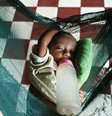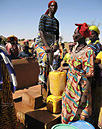Global Health Briefs
January - February, 2009 | Volume 8, Issue 1
Fifth annual PEPFAR report released
The fifth annual report of the President’s Emergency Plan for AIDS Relief [PDF, 64 pages] says the program will continue to address implementation research in the future through its Public Health Evaluation unit. “Because of its size and scope, PEPFAR offers unique opportunities to address and resolve issues related to the implementation of scientifically sound, cost-effective programs,” the report said. Mark R. Dybul, who heads PEPFAR, has been asked to stay on in the Obama administration.
To view Adobe PDF files, download current, free accessible plug-ins from Adobe's website.
Unicef: maternal death rates too high
 Photo: Unicef
Photo: UnicefThe average lifetime risk of a woman dying from complications related to pregnancy or childbirth in a less-developed country is 300 times greater than in an industrialized country, says Unicef. “No other mortality rate is so unequal,” it says, pegging the number of such deaths at about 1,500 a day. Visit “The State of the World’s Children 2009: Maternal and Newborn Health,” for the executive summary.
Kids are new face of Cambodia’s AIDS
 Photo: World Bank
Photo: World Bank “Children are the new face of Cambodia’s HIV/AIDS prevention efforts,” reports the Phnom Penh Post, based on new statistics from 2008, showing “unchecked mother-to-child transmission.” In the first nine months of 2008, more than 2,900 children received antiretroviral drugs, compared to 1,800 children in all of 2007, said Dr. Mean Chi Vun, director of the National Center for HIV/AIDS, Dermatology and STDs.
Eradication of two diseases in sight
 Clean water pumped
Clean water pumped
in Niger reduced
Guinea worm disease.
A worldwide effort to eradicate Guinea worm disease is 99.7 percent successful, according to data released by the CDC. Only Ethiopia, southern Sudan, northern Ghana and eastern Mali still are reporting cases.
The Bill & Melinda Gates Foundation, Rotary International, the United Kingdom and Germany have committed $630 million to eradicate polio, which still persists in Afghanistan, India, Nigeria and Pakistan.
To view Adobe PDF files,
download current, free accessible plug-ins from Adobe's website.